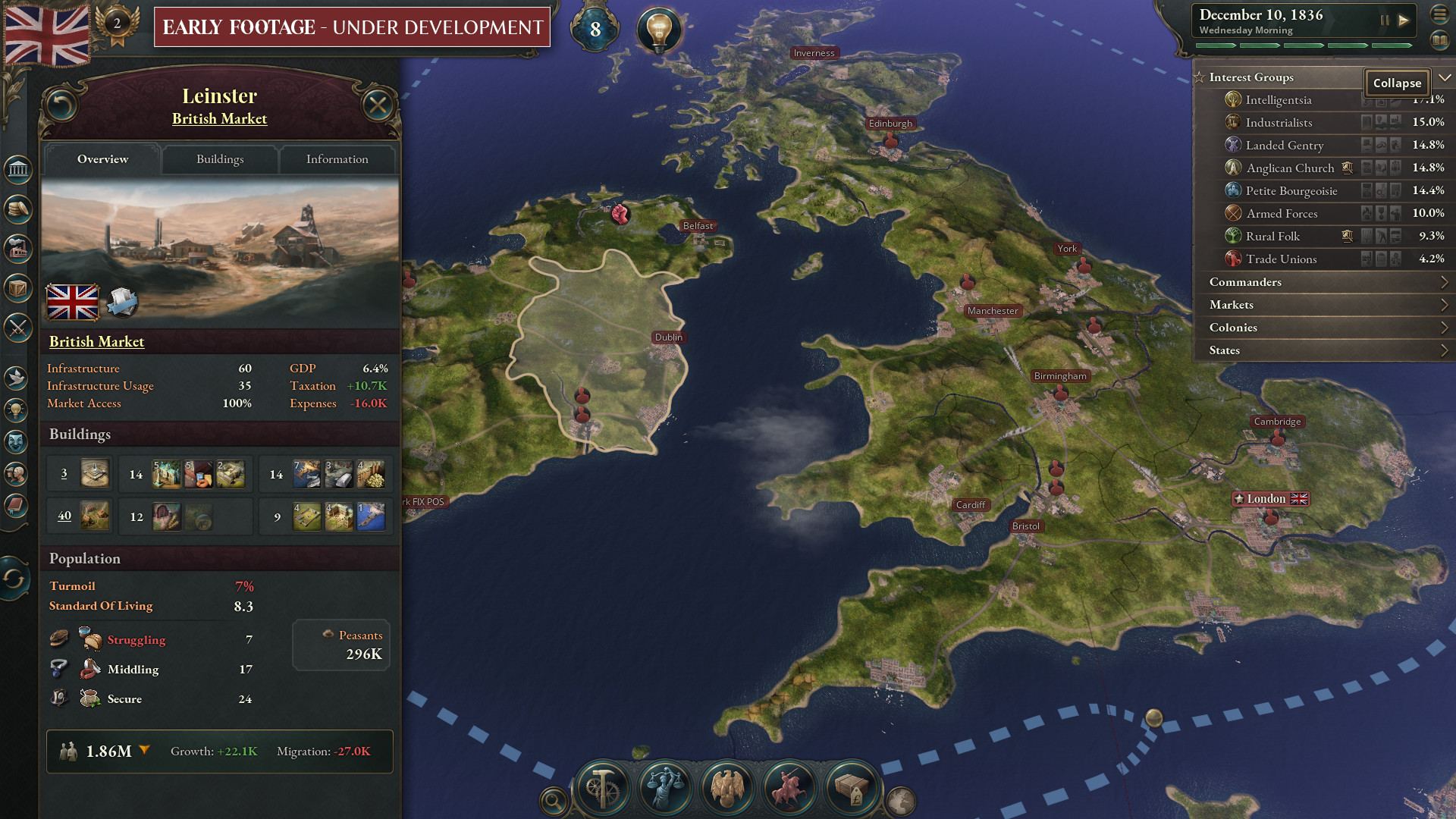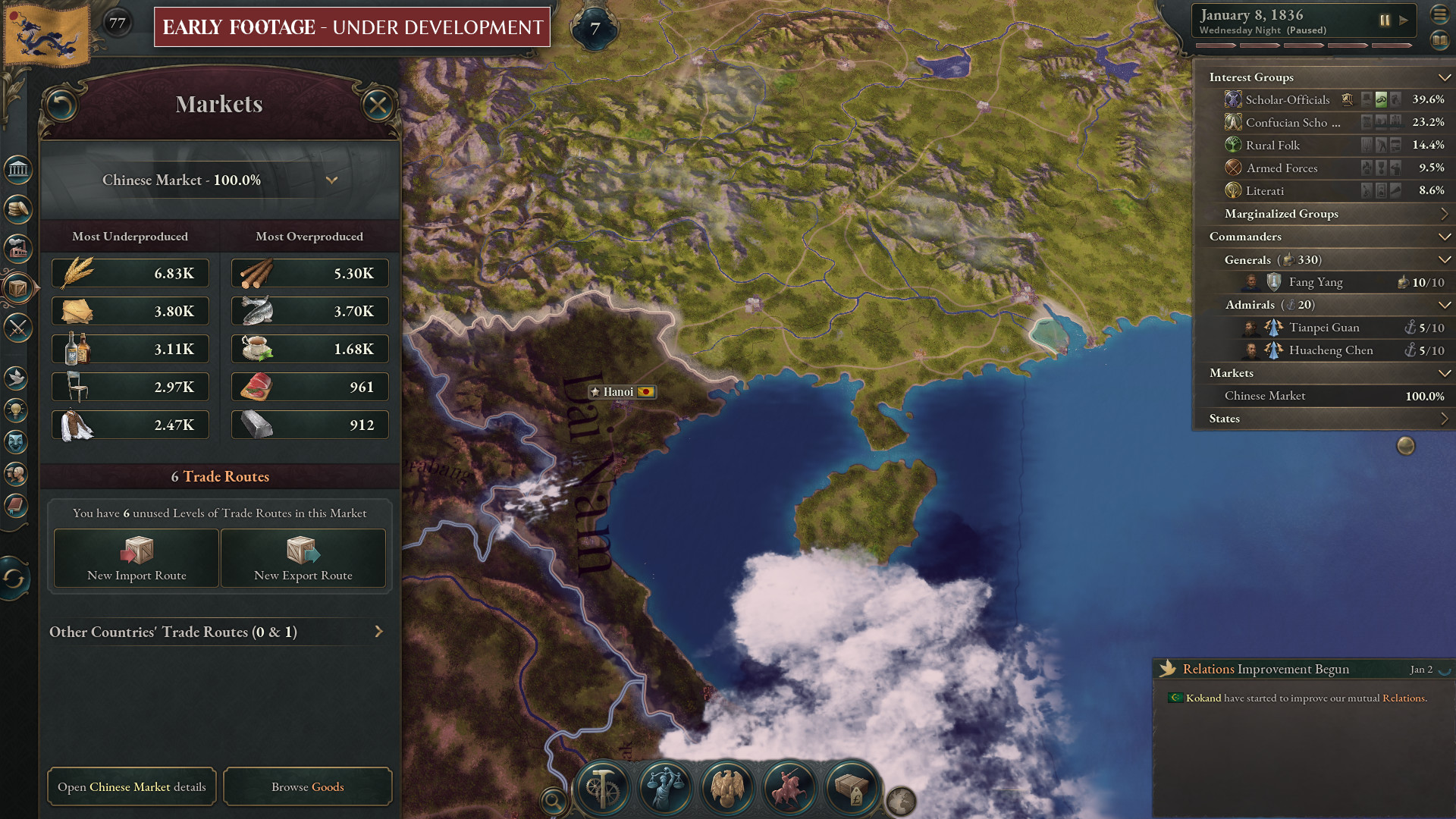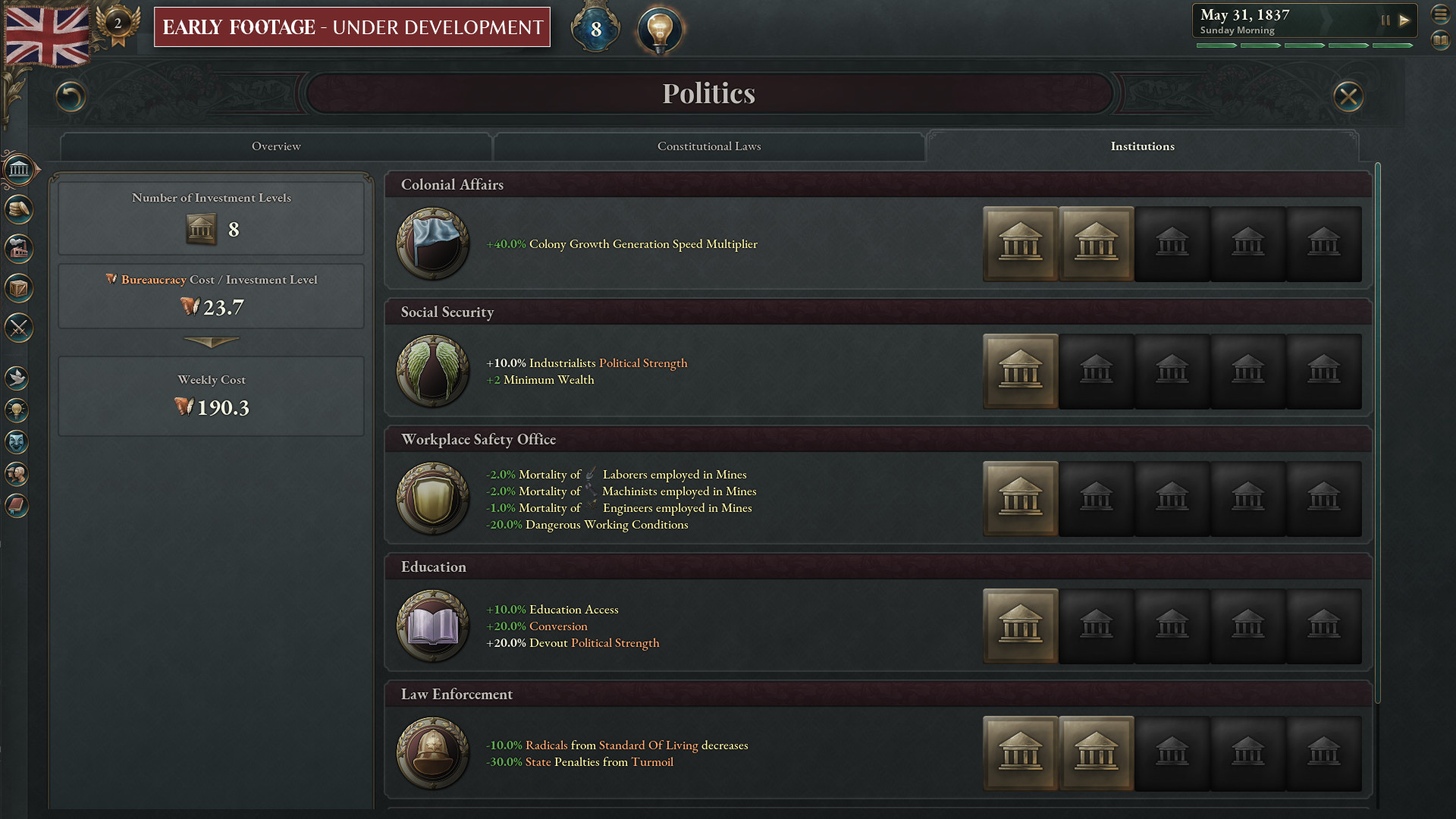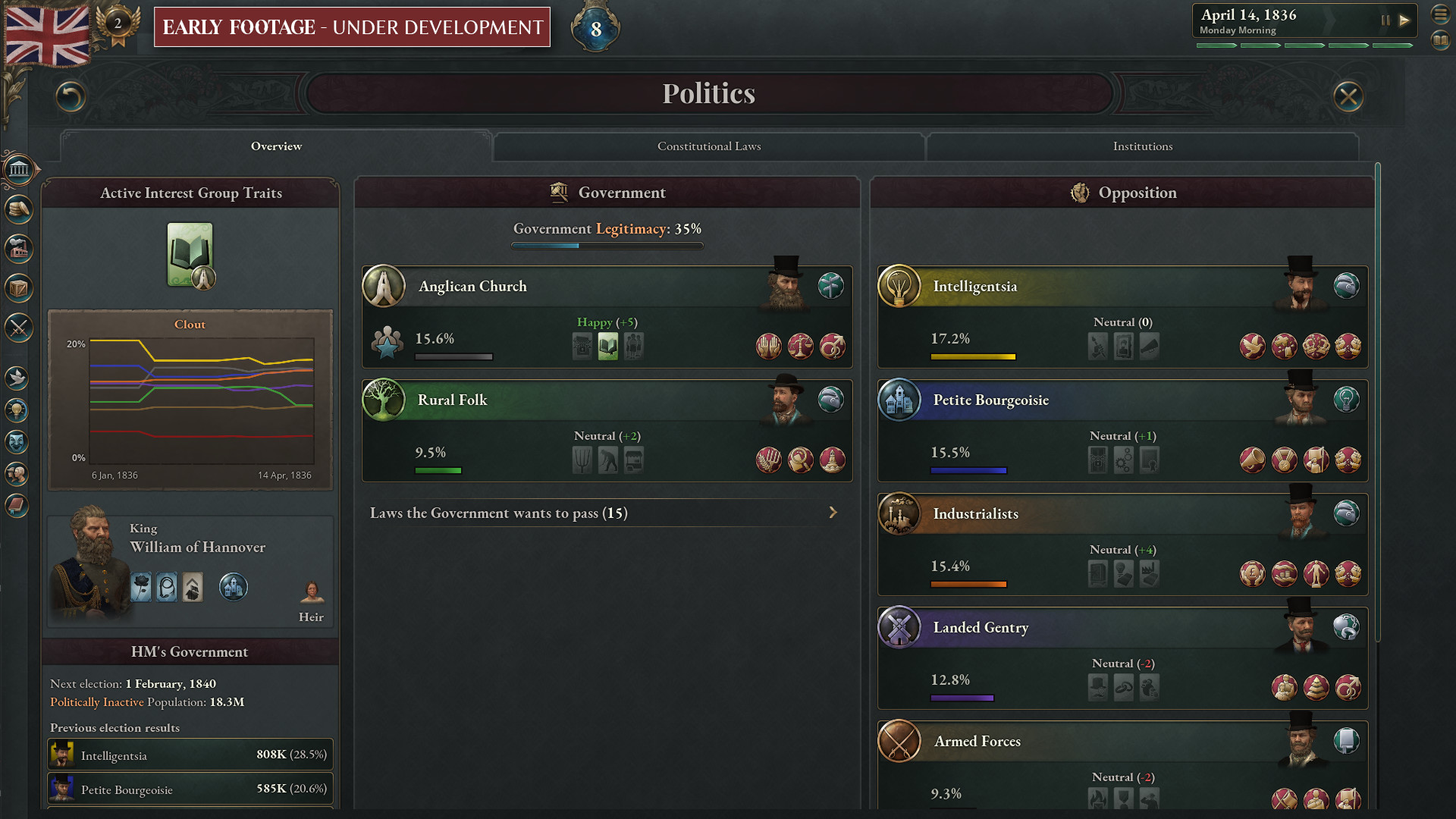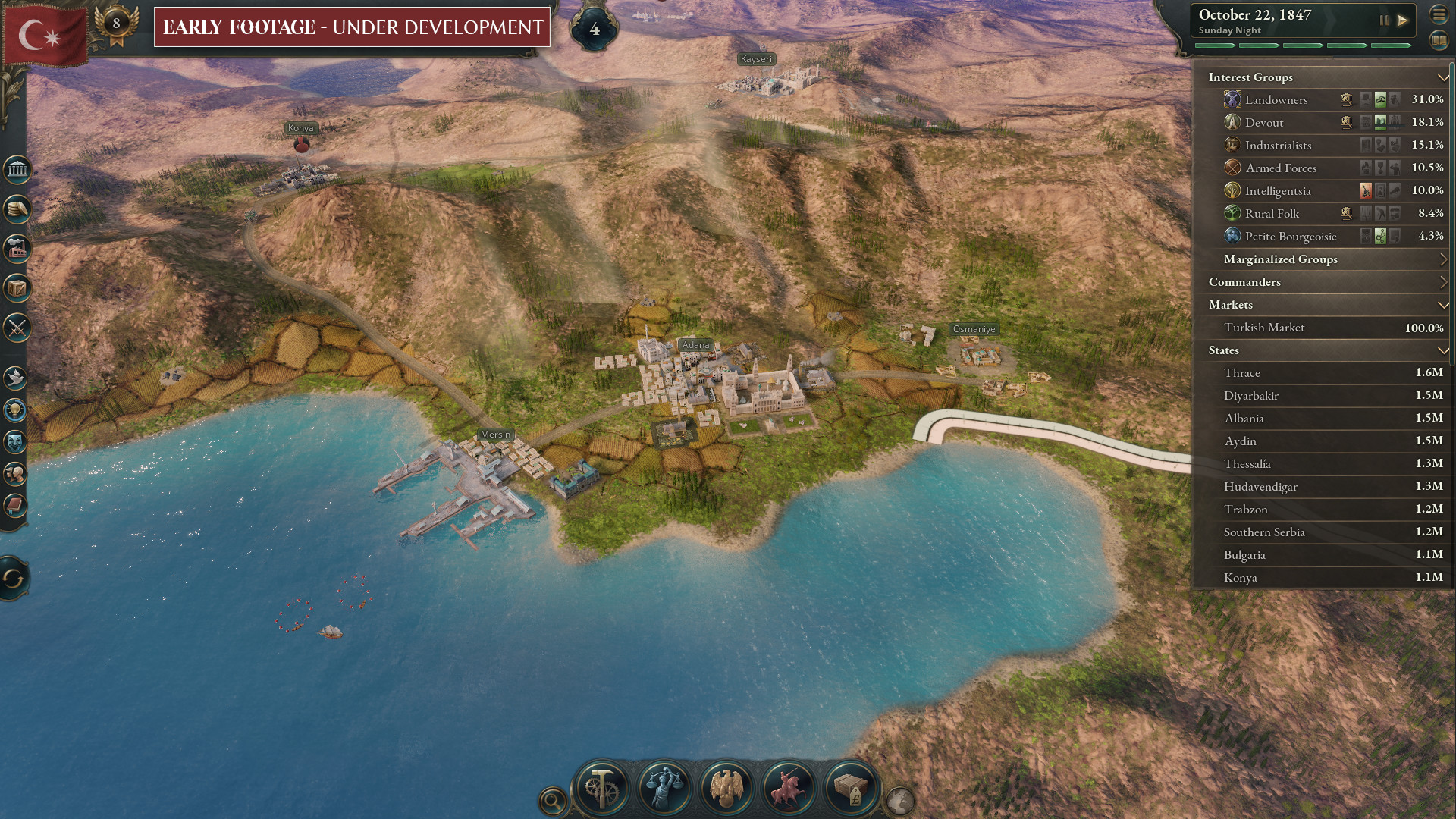SHAPE A GRAND TOMORROW
Paradox Development Studio invites you to build your ideal society in the tumult of the exciting and transformative 19th century. Balance the competing interests in your society and earn your place in the sun in Victoria 3, one of the most anticipated games in Paradox’s history.THE ULTIMATE SOCIETY SIMULATOR
- Lead dozens of world nations from 1836-1936. Agrarian or Industrial, Traditional or Radical, Peaceful or Expansionist... the choice is yours.
- Detailed population groups with their own economic needs and political desires.
- Reform your government and constitution to take advantage of new social innovations, or preserve the stability of your nation by holding fast to tradition in the face of revolutionaries.
- Research transformative new technology or ideas to improve your national situation.
DEEP ECONOMIC SYSTEM
- Expand your industry to take advantage of lucrative goods, taxing the profits to improve national prosperity.
- Import cheap raw materials to cover your basic needs while finding new markets for your finished goods.
- Secure vital goods to fuel your advanced economy and control the fate of empires.
- Balance employing available labor force with the needs for new types of workers.
PLAY ON A GRAND STAGE
- Use your diplomatic wiles to weave a tangled global web of pacts, relations, alliances, and rivalries to secure your diplomatic position on the world stage.
- Employ threats, military prowess and bluffs to persuade enemies to back down in conflicts.
- Increase your economic and military strength at the expense of rivals.
- Accumulate prestige and the respect of your rivals as you build an industrial giant at home or an empire abroad.

Hello and happy Thursday!
Its Lino, back from the depths of development, to talk about more details on Power Blocs, one of the central new systems coming to you with Sphere of Influence on June 24.
If you dont know anything about Power Blocs yet, I recommend you to give my first Dev Diary on them a good look because we will be referencing a lot of the terminology today.
[i]Small disclaimer for todays Dev Diary:
You will see a lot of WIP values, for modifiers and bonuses, for special powers and so on. Take them all with a grain of salt please, as were in the process of touching a number of these right now. If you have feedback on them, were happy to read it though! We have plans to adjust some values before release.[/i]
Identities
On release, there will be five different Central Identity Pillars to choose from for your Power Bloc. One of which is available to everybody, even if you did not purchase the DLC.The Identities differentiate themselves from another by a couple of things:
- All five Identities have a unique power that the leader has access to which is central to how the Identity plays out
- They have one or more unique effects for the leader or members
- The Primary Principle Groups which each Bloc needs at least one Principle from are different
- Some Principle Groups are unlocked only by a specific Identity
- How a Power Blocs Cohesion value is calculated depends on its Identity
Even if you do not own Sphere of Influence, you can play as the countries that have a historic Power Bloc at game start, even if they are not a Trade League (Great Britain, Russia, Ottoman Empire, Austria). You can keep the Principles their Power Blocs start with, that you would not usually have access to, but you will not be able to expand on them or replace them with other principles you could not usually pick.
The five Identities are:
- Trade League (free with 1.7)
- Sovereign Empire
- Military Treaty
- Ideological Union
- Religious Convocation
So lets look at some Identity details, shall we?
Trade League

The first big thing we can see for the Trade League Identity is their unique attribute which automatically makes every Power Bloc member part of a Customs Union under the Power Bloc Leader.
This lets you recreate the Customs Union pact functionality which will be removed with the 1.7 update.
Dont worry, for all other Identities there will be an alternative path which well get to.
Next up, we can see the Bloc Leader only effect for Trade Leagues. In this case, 4 Trade Routes will be free of bureaucracy cost for the leader.
Also the Internal Trade Principle Group is unlocked by this Identity and is in fact one of Trade Leagues Primary Principle Groups. One of these Primary Groups is required to be picked from when you first create your own Power Bloc.
Speaking of that Principle Group, here is a closer look at Internal Trade.



As you can see, the first tier comes with a heavy hitter in the form of a bonus to Market Access Price Impact (also lovingly called MAPI) for all Bloc members.
Growing convoy contributions to the Power Bloc Leader can be seen, alongside tariff increases and other infrastructure improvements due to the harmonization of regulations within the Bloc.
The other Primary Principle Group for Trade Leagues is the External Trade Group:

Note that in some cases (a customs union in the Bloc) the bureaucracy cost is not actually going to provide any benefit. But since you can use it also outside the Trade League, it will provide a benefit for you there.


Due to unified trade policies, various improvements to Trade Routes can be found in this group. But we also see a new thing in the list, which is the unlocking of a new Production Method (PM) for Trade Centers.
When selected, that PM will replace the base PM since it is an upgraded version of it and provides you with a bonus to Influence!
Last but not least, we can see that on tier 3, members will gain the power to establish trade routes without requiring interest in the region. That should make it easier, even for small member countries, to engage in trade across the globe.
The last thing that is specific for Trade Leagues is how their Cohesion value is calculated. For this we look at the leaders GDP share of the total Bloc GDP. The higher the leaders share, the better for Cohesion. Then we also apply a penalty for each shortage that is happening in your market. To compensate for this, we are adding a bonus for each top producer of a good (rank #1 to #3).
Sovereign Empire

Onwards to the Sovereign Empire Identity. At game start, multiple Power Blocs will have this at their core. Namely the British, Russian and Ottoman Empire.
It allows the leader to subjugate other Power Bloc members and make them a vassal of their own!
Additionally, choosing this Identity reduces the weekly Liberty Desire progress of all subjects that the Power Bloc leader has. Note: The current effects description is wrong, it will be updated for release to indicate this applies to their subjects, not themself.
Next up we also have two Primary Principle Groups for the Sovereign Empire. Lets start with a closer look at Vassalization:



We can see that it does what the name promises - various improvements to having subjects and managing them with the third tier even allowing you to enact decrees in your subjects which you use to further bolster them.
Next is a group that is exclusive to Sovereign Empire Power Blocs, Exploitation of Members:



Here we see that this group comes with some penalties for the regular members, in favor of only providing the leader with benefits.
In turn, since members will not enjoy that of course, the Power Blocs Cohesion takes a hit. So you will need to evaluate if the benefits outweigh the costs for you or if you are able to find other ways to cut down on Cohesion penalties.
Speaking of Cohesion, for Sovereign Empires you will have to manage your subjects and strengthen your Prestige. The highest Liberty Desire among the leaders subjects imposes a penalty of equal value. So if the British East India Company has the highest Liberty Desire among the British subjects with a value of 40, the Cohesion penalty will also be 40 for example.
On the other hand leaders get a bonus to Cohesion based on their share of total Prestige in the Power Bloc.

The third Identity were looking at today is the Military Treaty (yes, it received a catchier name).
Military Treaty

Military Goods Cost is a placeholder effect which will be replaced before release
First thing we see is Allows free War Goal. But what does that mean? It means that the Leader of a Military Treaty Power Bloc may add a single secondary War Goal to any Diplomatic Play of members that the Leader is also involved in, even if they joined of their own volition. This war goal can cost up to 30 maneuvers, but it will not actually subtract any when selected.
There is also a placeholder modifier in this screenshot (which will be replaced before release!), that reduces the military goods cost for all Bloc members. In its place another effect is going to be added, with the focus remaining on the military side of things of course.
In addition there are a few more for increased Prestige from Power Projection for both, leader and member.
As for the other identities, we have two Primary Principle Groups, one of which is exclusive to Military Treaty Blocs.
The first group is Defensive Cooperation:



Like most other Principle Groups, Defensive Cooperation does what you would expect. Through mutual commitment, Power Blocs with this Principle are not able to wage war among each other. On the higher tiers, swaying countries gets easier if youre the target of a play and on tier 3, all members are being forced to join all Diplomatic Plays if a member is being targeted.
But what would imperialism be without waging some war yourself? Thats what the other, exclusive to the Military Treaty group is for:



Ranging from lower infamy generation to forcing every member to join all Diplomatic Plays of any other member, this group is for you if youre planning to conquer the world (or at least parts of it). Beware of the Cohesion penalty on the third tier due to members not wanting to go to war constantly.
Cohesion in Military Treaty Blocs is dependent on the leaders share of the Blocs Power Projection, similar to how Prestige works for Sovereign Empires in that regard.
Reductions to Cohesion are based on the highest infamy value in the Bloc and the country with the worst relations with the leader.
Next up, were taking a peek at Ideological Unions:
Ideological Union

Here we see that Ideological Union leaders can Force Regime Changes in member countries. There are a few conditions like how different their laws need to be compared to the leaders, how much Cohesion the Power Bloc has and some minor others.
When you do it, what happens is again what you would expect: You enforce a regime change on the target country, changing their laws, without having to go to war.
Good thing the Ideological Union Power Blocs have an easier access to Regime Changes. Because one of the negative Cohesion factors for these Blocs is the country with the biggest difference in Governance Principles and Distribution of Power law groups compared to the leader.
A positive factor is found in the form of the leaders Legitimacy.
Creative Legislature and Ideological Truth are the two Primary Principle Groups for Ideological Union Power Blocs, with the latter being exclusive to them.



For Creative Legislature we see various bonuses to the enactment of laws. It allows you to have more setbacks on the third tier, essentially giving you another roll at it, in addition to the reduced stall chance, making the process proceed faster. Also, it reduces Movement spawn chances that would undo the work you are trying to do with the enactment of your desired law.
Now lets take a look at the Principle Group exclusive to Ideological Union Blocs.



Here we can see that this group focuses on Interest Groups (IG) and your government. It not only makes unwanted Agitators lifes harder, lets you bolster your desired IGs and suppress your enemies at the cost of less authority, but even increases your Minimum Legitimacy by 25 on the third tier.
The fifth and last Central Identity Pillar is great for everybody who always wanted to play as a religious great power, uniting the world.
Religious Convocation

Religious homogeneity is what this Power Bloc Identity strives for. It allows leaders to impose their state religion on other members. Its an unique Diplomatic Action which will set a member's State Religions to the leaders. Similarly to other Power Bloc Leader actions, it requires a certain Cohesion and Prestige value and also cannot be used immediately on a new member.
The Religious Convocation Identity also boosts conversion rates in all members, which goes nicely with your power to convert Power Bloc members. For release, were supplementing this effect with another one, likely along the lines of reducing radicalism.
Its Primary Principle Groups both deal with the involvement of church in different aspects of life.
The first of the two is also exclusive to the religious Identity - its Divine Economics.



We see here that we get various effects with relation to faith and economy. Higher subject payments if theyre following a different religion, but on the flip side higher trade route competitiveness if they are following the same religion for example.
The PMs that you can unlock on tier 2 allow you to exchange some workforce in the new Manor House and Financial District buildings with Clergymen. You dont have to make use of it of course, but you get the option to.
The other Principle Group is Sacred Civics:



This group features three unique effects. It improves upon Liberty Desire and general acceptance for diplomatic proposals if the country shares the same state religion.
On tier 3, you can see it also allows the leader to impose their own church and state laws onto Power Bloc members.
Cohesion for Religious Convocations has a few factors as well. First, it looks at the leaders Devout IG clout to determine a bonus to Cohesion. Secondly, we add or subtract Cohesion based on the lowest share of population in a Bloc member that follows the same religion as the leaders state religion.
So if you have a member that has 0% of their Population following the same religion as yourself as leader, you will get a penalty, but if you are actually able to have the lowest member value be 50%, you will get a bonus instead.
That was a detailed look at all the Identities. But wait, theres more!
Principles
Apart from the Primary Principle Groups, there are a number of other groups of different flavors that you can make use of to assemble your dream Power Bloc. In total, including the 5 Identity exclusive groups, there are 20 Principle Groups with three Principles each for you to choose from.
Here are some examples:



This Principle Group is the alternative route to get to a Customs Union without having to pick the Trade League Central Identity Pillar.
It comes with a few other bonuses on the lower tiers, in particular the +5% MAPI bonus you have seen in the Trade Union exclusive group.
Another example Id like to show because of its differently themed effects is Police Coordination.



This group provides multiple positive effects for the Police Institution in particular and upgrades its effects. The +50 Authority and reduction in Political Movement Radicalism is applied to each level of the institution. So the deeper you go into this, the more you will profit from it too.
The last group we want to show you today is dealing with Foreign Investment.



We can see three interesting effects in this group. On the first tier, you will get a higher amount of Leverage from Economic Dependence which, if you recall, is based a lot on how many investments you have in another country which makes them more dependent on you.
The second tier provides you with a reduction for Nationalization cost, which you can make use of to decrease your own dependence on other countries for example.
On the last tier, every member of the Bloc gets automatic Investment Rights in other Members of lower rank. This should allow you and other powerful countries to spread your influence inside your Bloc more easily, which in turn makes it more likely for the lower rank countries to stay inside your Bloc.
Another thing that has changed slightly since the original Power Blocs Dev Diary is the slots that are available to your Power Bloc.
If you own Sphere of Influence, by default each Power Bloc youre leading has two slots that you can fill with Principles.
Even if you dont own the DLC, you will still have one slot available for customization, where you can choose one of the two Primary Principle Group paths to take.
You can unlock the third and fourth slot by overtaking the other Power Blocs in the rankings for which we look at the total prestige of all members.
For the third slot you will need to be among the top 5 Power Blocs and have at least 5 members, the fourth one will be unlocked if you are among the top 3 and have at least 10 members in your Bloc.
Due to this change, we have removed the maximum number of Principle Mandates which you can spend. So in theory you can now get to 4 fully leveled tier 3 Principles, it is just going to be harder for you to do so.
Next, Id like to provide you with a seemingly small, but significant update to how we deal with Leverage.
Leverage 2.0
Since the last Dev Diary on Power Blocs, we have made some changes to how Leverage works and also added a few more sources of Leverage. If you recall, Leverage is what you need to build up in other countries to make them join your Bloc.Apart from the sources mentioned last time, we have now added factors for adjacency, meaning if you have a direct adjacency or a treaty port for example, you will get more Leverage in the target country. High infamy values on the other hand will reduce the gain of Leverage, so you will have to keep it in check if you want to make good use of the resources youre investing into building up Leverage.
Various other diplomatic pacts now will also provide or reduce the Leverage you can build up in other countries.
The main change weve done though is how Leverage is calculated. Before it was basically a never-ending race of building up infinite amounts of Leverage. Now we have changed it so that there is instead a shared pool of 1000 Leverage which all involved parties (including the target country) need to fight over. This value of 1000 never changes, never shrinks or grows.
The best way to understand this is by looking at a screenshot of the WIP tooltips that our UX designer Aron has made:

Here we see (from the British perspective), how Leverage over Greece is currently split up and what distribution it is trending towards.
In the upper bar, we see the current Leverage situation and we can see that Greece is currently able to stand up for itself against the Blocs trying to influence it. Its value of 584 is 490 higher than the British value which therefore is currently at 94, resulting in 9.4% Leverage Share for Great Britain. The Greek value is also directly translatable into their Leverage Share of 58.4%. The target countrys Share is called Unclaimed Leverage since no Power Bloc is taking that for themselves. If no Power Bloc was active in gaining Leverage in Greece (this should barely ever be the case), their Leverage Share/Unclaimed Leverage would be 100%.
What is actually happening in that situation though is that all 4 involved Power Blocs currently have a higher Leverage Factor (which is kind of like a Leverage income) than Greece has resistance. They might have a bunch of diplomatic agreements with Greece or trade or have sided in Diplomatic Plays with them for example. So over time, the Greek share of the pie will decrease, while all Power Blocs in this case will make gains and expand their influence over Greece, eventually (and if nothing about this situation changes) resulting in the situation depicted in the bar on the bottom of the tooltip.
The Russian Empire will have roughly 40% of the Leverage Share then and will likely be able to invite Greece to their Bloc with a good chance of success.
You can hover over each bit of the bars of course to get more detailed information on how the depicted share is calculated.
This system change makes Leverage something worth fighting over even if you are late to the party because nobody will be able to accumulate mountains of Leverage before you try yourself to get active in the country.
It also makes it possible to not only build up more Leverage, but reduce another Blocs Leverage Share, by having more positive Leverage Factors going for you than they do.
Another thing that wed like to bring to your attention is a few examples for how Leverage is tied into our narrative content, in particular the Great Game content that was presented to you in the previous Dev Diaries for the Great Game and the Graveyard of Empires .
For example, in the Afghan unification, if you appeal to Great Britain or Russia, this will create Leverage on your country for their respective Power Blocs.
Similarly, the Eastern Frontier Journal Entry buttons and also an accepted Circassia recognition will create some Leverage for the according Power Blocs in the target country.
Thats it for today. We hope you liked this expanded outlook on Power Blocs. Next week, Alex is going to talk about some general changes that were making with the 1.7 update. Get ready for a cute mapmode and have a lovely rest of this happy Thursday!
Minimum Setup
- OS: TBC
- Processor: TBC
- Graphics: TBCSound Card: TBC
Recommended Setup
- OS: TBC
- Processor: TBC
- Graphics: TBCSound Card: TBC
[ 6374 ]
[ 5785 ]
[ 751 ]
[ 2194 ]

